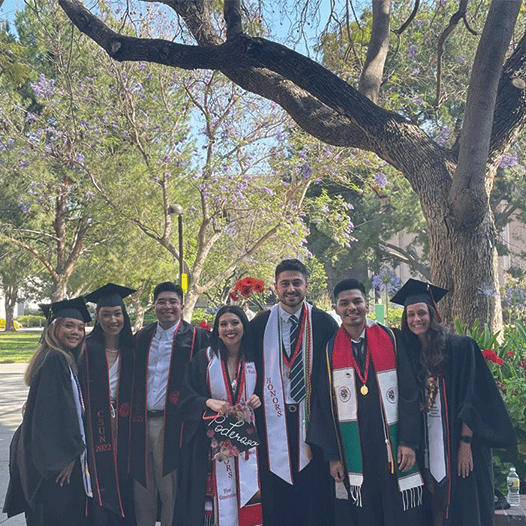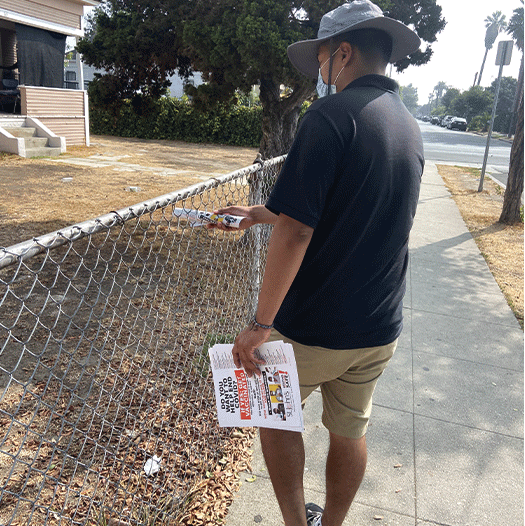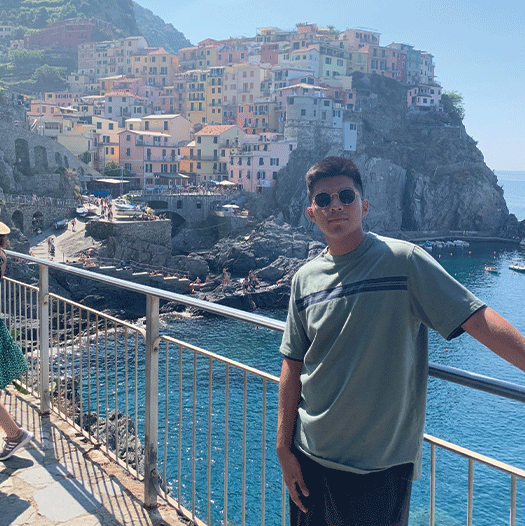November 3, 2022
Overcoming imposter syndrome: Jason Cruz Velasco's journey and personal triumphs
Born and raised in the San Fernando Valley, Jason Cruz Velasco grew up in low-income area in Panorama City. There were no parks nearby where Velasco lived, so he would walk acouple of miles to the nearest park to play basketball with his childhood friend.
“It was [a] dangerous area where I lived, and as I got older, it slowly got better,” Cruz said.
While Cruz was aware of the health disparities in his community, he believed them to be normal until he grew older.
“I started to realize how things weren’t [supposed to be] that normal compared to other places,” Velasco said. “Like, there [weren’t] any free local clinics in my area. It’d be three bus rides away.”
This marked thebeginning of Cruz’s interest in public health.
“[My circumstances] were something that I feel really affected me growing up,” he said. “I want to find a way to fix them and help in any way I can. In the late future, I would see myself as a director of a nonprofit working to make programs to combat these issues.”
Cruz’s parents always instilled the importance of education to him. As a first-generation college student, Cruz believed he would attend university, graduate and succeed.
The road was not always easy, however.
“I just didn’t know the steps to get there,” Cruz said. “So, throughout my life, I tried to gather information of how to get to any sort of college, or what college was about. That was a big thing growing up for me.”
At California State University, Northridge, Cruz was a public health major with a specific interest in health disparities and the social determinants of health. Cruz also involved himself with several public health related projects during this time.
During the start of the pandemic, he helped his neighbors sign up for the COVID-19 vaccine and COVID-19 tests where he assisted them navigating through the online sign-ups.
“There [was] a language barrier due to the web applications having to sign in and fill out the information [with most] of it in English,” Cruz said.


He also currently works as a contact tracer for the University of California, Los Angeles.
Cruz was also an intern for the Health Equity Research and Education (HERE) Center during Fall 2021 and Spring 2022.
“I saw it pop up in my Instagram through HESO CSUN, and [I’d] never heard of the HERE Center before that,” Velasco said.
Through the posts on social media, Cruz read about the center’s goals and projects. Because the center’s goals fit with Cruz’s focus on health disparities and social justice, he immediately applied for the internship position and was accepted.
“It was everything I wanted to do,” Velasco said.
Cruz worked with Dr. Carrie Saetermoe and Dr. Lisa Chaudari the most. In particular, Cruz worked on several town halls centering on houselessness, policy and physical activity.
Collaborating with Dr. Chaudari, Cruz’s work on the physical activity town hall entailed creating a presentation that focused on different physical activity areas such as local recreation centers and local parks.
“Dr. Chaudari always pushed me to go out of my comfort zone,” Cruz said. “She’d always assist me with anything—every step of the way of a certain project, and she believed in me a lot,”
Cruz emphasized how both mentors were instrumental in his experience at the HERE Center. While Dr. Chaudari encouraged Cruz to expand his horizons, Dr. Saetermoe was a constant source of support for Cruz.
“They were always there for me—motivating me, inspiring me and helping me with any questions I needed,” Cruz said.
Overall, he described his experiences as an intern as “welcoming and encouraging.”
Nonetheless, Cruz still faced struggles juggling his academic, professional and personal responsibilities. Aside from taking a full course load andfulfilling financial duties, Cruz dealt with imposter syndrome for the longest time.
“I always thought that I didn’t belong even when I got to CSUN,” Cruz said. “In my first my first semester, I got bad grades, and that was because I didn’t have any [mentor] to guide me. I couldn’t go to my parents for help or anything.”
However, when Cruz took a Chicano Studies class, he realized it was empowering to know his history—to understand what his parents and grandparents went through for him to be there. It madehim realize he deserved to be where he was, as much as anyone else.
“I still have issues with imposter syndrome, but it’s gotten better. I think I’m really capable of doing whatever I want [just like] anybody else, you know?” Cruz said.

